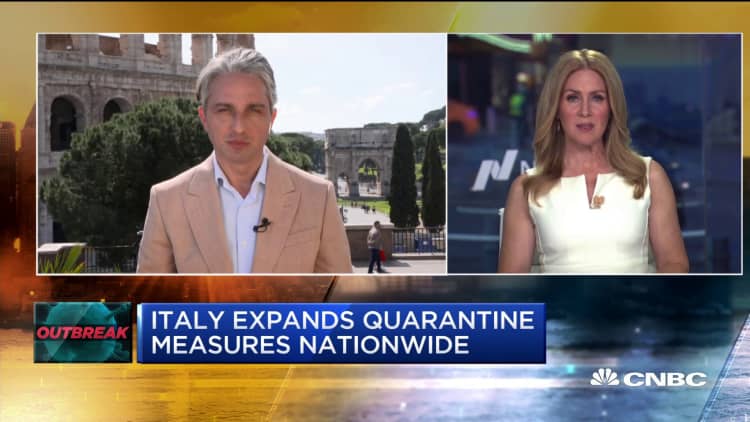More than 10,000 people have now been confirmed to have the coronavirus in Italy as a national lockdown remains in place, with even tougher measures being considered.
Italy has now 10,149 confirmed cases of the virus, according to Johns Hopkins University and Italy's Civil Protection agency, and 631 deaths from the virus, up 168 from Monday.
As the health emergency brings Italy to a standstill, Italy's Prime Minister Giuseppe Conte announced Wednesday that the government will set even more money aside to tackle the outbreak, raising it to 25 billion euros ($28.3 billion) — up from the 7.5 billion euros announced last week.
Conte also did not rule out even more restrictive measures on the country, despite a national lockdown in place, restricting the movement and activities of the country's 60 million inhabitants.
The lockdown is seen as a way to stop the spread of the virus that has hit Italy's ageing population. Italy's Civil Protection Chief and Coronavirus Emergency Commissioner Angelo Borrelli said Tuesday that 45% of those that have died were aged between 80 and 89, and 32% were in their seventies, 14% were over 90, 8% were in their sixties and 2% were aged between 50 to 59.
Conte introduced the extended lockdown, pitched as the "I'm staying home" decree, on Monday after a regional quarantine in the most badly affected northern part of the country was seen as inadequate.
Public gatherings are banned, ranging from weddings to funerals, sports events and religious services, and Italians are encouraged to stay home and "limit social contact as much as possible." Travel is only allowed for urgent work situations and emergencies or health reasons.
Some bars and restaurants remain open but are operating on limited opening hours with no commercial activities (except for supermarkets) meant to take place after 6 p.m. Schools and universities remain closed; the national lockdown is in place until April 3.

'Close everything'
There are signs that even stricter measures could be imposed, however. Opposition politician and influential Lega Party leader Matteo Salvini led calls Tuesday to "close everything immediately."
Borrelli did not rule out tougher measures either, telling a news conference Tuesday: "I think this request must be examined, considered and assessed," ANSA news agency reported.
Economists are trying to quantify what a shutdown could mean for Italy, the third-largest economy in the euro zone but one laden with debt which was already fragile before the outbreak.
Marco Protopapa, an economist at JPMorgan, said Tuesday night that his research team had noted "that press reports ... hint at the concrete risk of a further escalation of measures to an unprecedented level, at least in the North."
"According to the press, the regional authorities of Lombardy and Veneto have asked for a Wuhan-style full shutdown (including factories) of 2 weeks in order to prevent a collapse of the health system overloaded by the number of infected cases requiring hospitalization," he said in a note.
"Of course, such a new measure, even if only applied to a part of the country, would pose additional and even harder to quantify downside risk, as the affected population would effectively be imposed a 24 hour curfew for 2 weeks, with everything closed except grocery shops and pharmacies and health care facilities."
Protopapa said "we will see how things evolve." As for the economy, he noted that "the fact that growth was rebounding nicely in early 2020 is hardly relevant in the current context. However, as a silver lining, we now are at the margin more confident that the economy can rebound sharply after the end of the COVID-19 shock, provided that an appropriate fiscal policy reaction removed tail risks."
JPMorgan now expects Italy's economy to contract 7.5% in the first quarter from the previous quarter, with a modest 2% pickup in the second quarter before a full rebound in the third quarter.


